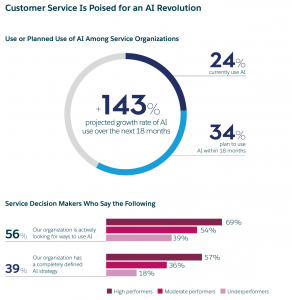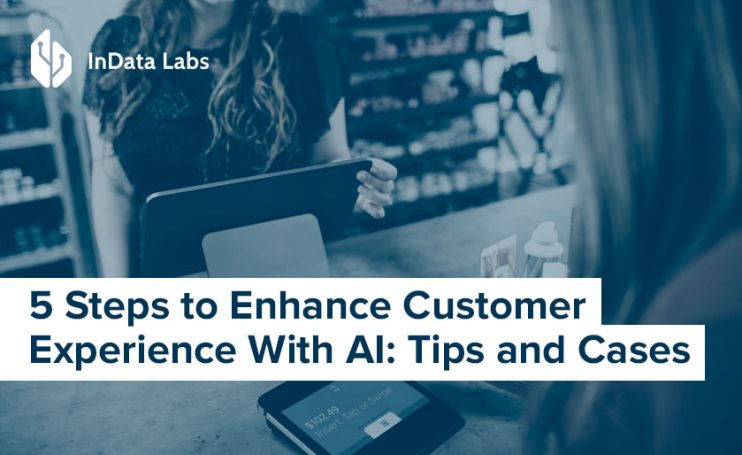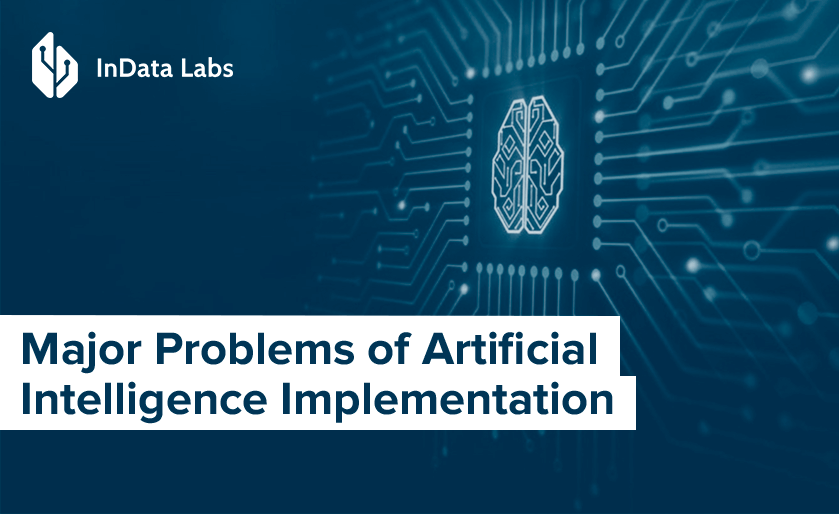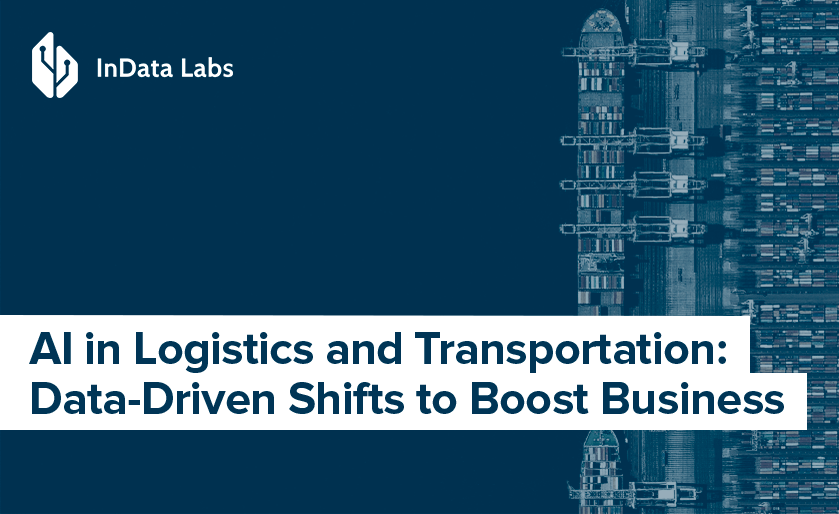With the growth of computational power and, hence, machine learning solutions, artificial intelligence (AI) is creating more and more value across different industries. To cut off all the hype, AI is unable to do many things that humans can. In some aspects of life and business, AI can act smarter than humans but not in a fully independent way. Under the necessary supervision, AI is able to augment or enhance arrays of manual and repetitive tasks or decision-making processes.
By the year 2030, AI value is estimated to reach 13 trillion dollars. AI could best contribute to such industries as retail, travel, logistics, banking and finance, and automotive and assembly. And various changes that AI development brings in for many companies is, above all, about improving customer experience (CX). Many thriving businesses have already placed a major focus on harnessing AI for driving CX transformation.
AI Disrupts Different Industries
AI has a great impact on how companies interact with customers to gain a competitive advantage. And the importance of AI for CX is in steady increase. In the light of this, business owners need a viable AI strategy in place. Salesforce reports that 24% of service companies currently have AI in use and 34% plan to implement AI in the two years to come. Share on X However, only 39% of business leaders say that they have a defined AI strategy in place.

Source: Salesforce
To have a strategy means clearly define steps to success. There are five pillars of employing AI to transform CX and add to business value:
- Enhance self-service capabilities
- Focus on further personalization
- Ensure 24/7 customer support
- Automate pre-ordering, scheduling, online purchasing, and other routine tasks
- Consider data privacy and ethics issues
By adopting an AI strategy, companies will invest in the happy customer journey, cut customer churn, and improve conversion rate. Depending on the industry that a business is operating in, business owners welcome different transformative changes.
Brick-and-Mortar Retail and E-Commerce
It is fascinating how Warby Parker, an optical industry representative, uses AI to help customers pick glasses online. Thanks to augmented reality, customers can select and try on different frames. The tool uses the camera of iPhone X and Apple’s Face ID to scan a customer’s face and then recommend frames.
The e-commerce provider also employs some of the latest marketing techniques. For instance, marketers pay special attention to user-friendly and engaging language for the website, chatbots, and emails. AI makes it easy for customers to find what they want and helps ensure a personalized approach for each customer.

Source: Shutterstock
AI helps Warby Parker connect online and in-store customer experience. AI-powered personal recommendations can navigate to a store in a specific location. Customers can also get more informative answers to their queries from an AI-powered system than in-store employees.
Personalized Banking Experience
Financial companies need to use AI in customer service more actively to improve customer retention. Data-based predictions, recommendations, and automation of administrative tasks form the cornerstone for improving business efficiency.
AI can be used to monitor money transfer activities and offer a better interest rate. And since customers sent a lot of queries about financial operations and services, AI chatbots can ensure 24/7 availability. Automated answering simple FAQs can be used to cut down repetitive operations and improve service productivity.

Source: Shutterstock
Many banks also offer personal financial management to aid customers in monitoring expenditures and taking better financial decisions. AI can take over from human assistants in generating guidance based on unique customer behavior.
To add more, debt collection agencies can derive benefits from adopting AI. Predictive analytics models – like the one that InData Labs built for a client in the industry – can help improve debt collection effectiveness. The algorithm makes it possible to gather and analyze data from relevant companies’ or customers’ accounts and predict a payment from an account.
Automated Assembly Lines

Without further ado, Amazon is the leader in implementing AI and robots in workplaces. The automation of various operations takes place at every stage of ordering and delivery. Amazon installs AI-driven machines in warehouses to increase safety and improve efficiency. The technology involves assembly line machinery That allows excluding manual packaging and boxing of multiple orders.

Source: Seattletime
Let’s provide some stats. Amazon’s robots can package orders five times faster than humans, which is 700 orders per hour. All human employees need is to put items one by one on a conveyor belt. For employees, it means that their jobs are under the risk of elimination. However, Amazon claims that full replacement of warehouse employees with the technology is out of the question so far. As for customers, robotic process automation results in the reduced time of order delivery and lower markup.
Revamped Traveling Experience
Seamless CX can help a travel agency build customer loyalty and reach a large target audience. To ensure happy holidays for each customer, agents have to work with massive amounts of data. This data includes personal information, customer behavior analysis, online search results, and more. AI-powered solutions can help efficiently process big data to ensure high-level personalization and real-time assistance.
Carnival Corporation, US, operates cruise ships and offers traveling to more than 700 tourist destinations. They focus on providing end-to-end cruising experience and have the goal to give consumers whatever they want at any time.
The use of wearable devices, IoT, and AI powers the Ocean Medallion – a device that helps users get an extremely personalized experience. Based on customer preferences, the device can help a user select activities and make restaurant reservations beforehand, allow passengers to access their rooms without a key, deliver invitations to events and personal recommendations, offer intelligent navigation throughout the ship floors, monitor in real time what passengers do and adjust the customer support to current needs.
Predictive Logistics
Leading logistics companies use the power of big data and AI-driven technologies to achieve and maintain a competitive edge. As AI technologies are maturing, the number of application options in the industry is growing.
Predictive maintenance helps ensure reliable and smooth work of supply chains. Today’s capabilities of predictive modeling enable robust forecasts as the output. Logistics operators can now make informed decisions and better predict and avoid critical breakdowns.

Source: Shutterstock
Machine learning and natural language processing allow AI-driven systems to monitor media sources, analyze customer feedback, conversations, and sentiment to ensure further improvements of AI-powered customer service. Image recognition can be used to track order shipment and deliver real-time notifications to a customer. Both logistics service providers and consumers can greatly benefit from AI. The solutions help predict delays, optimize delivery routes considering weather conditions, and cut shipment costs.
IBM admits that the future of AI for customer experience is the omnipresence of AI in different industries. It will assist in predicting, automating, and personalizing every aspect of interactions with consumers. Business owners need to think ahead and opt for a trustworthy provider of AI software development services to partner with. By using AI for customer experience transformation, companies will move towards the era of automated interactions with consumers and fine-tuned customer service.
Grow Your Business with Our AI Software Development Services
Schedule an intro call with our AI software development engineers experts to explore your business and find out how we can help.


